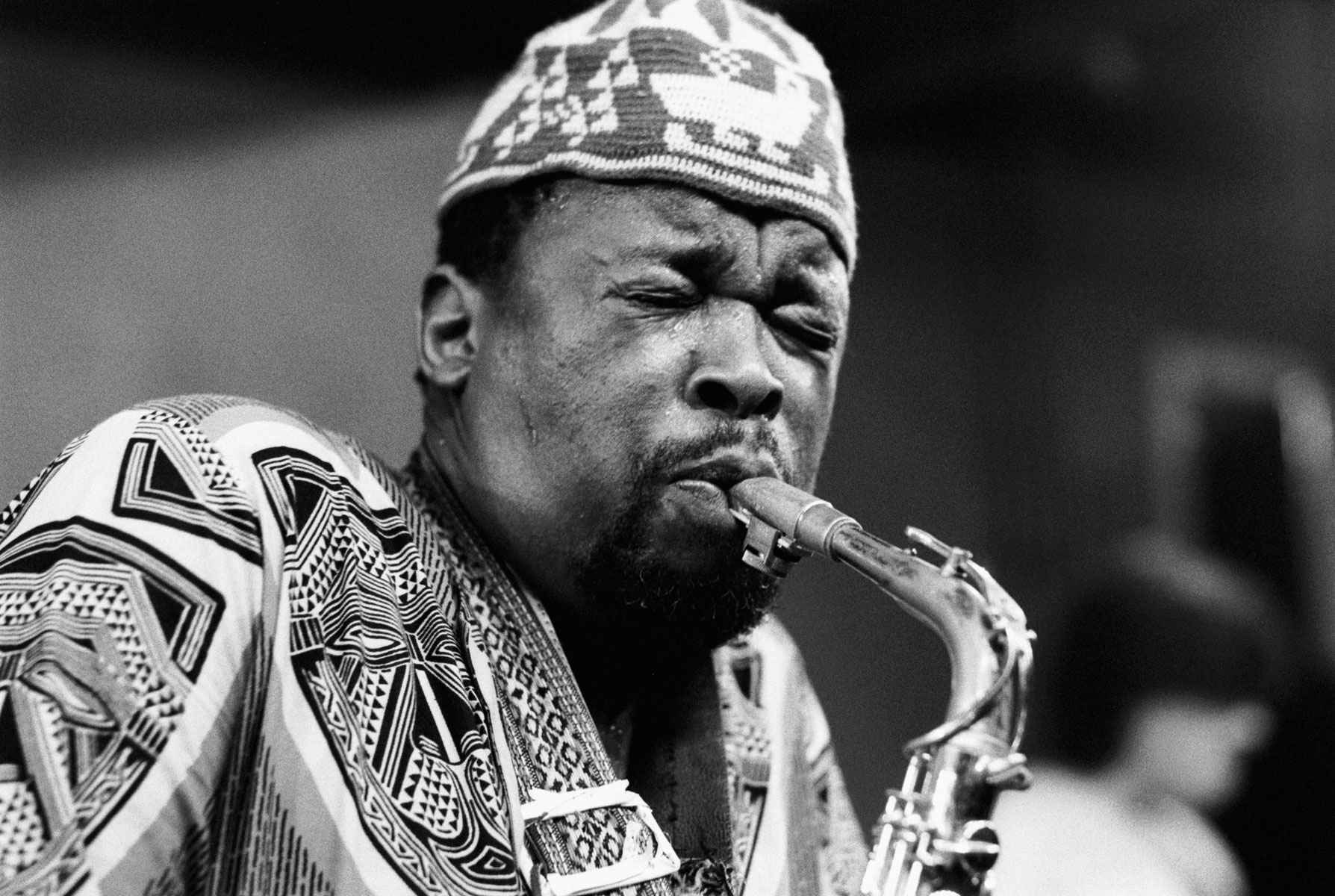Review | Dudu Pukwana and the ‘Spears’
The reissue of two recording sessions by Dudu Pukwana and the ‘Spears’ adds a vital missing piece to the incomplete jigsaw puzzle that is South African jazz history.
Author:
23 June 2020

Oxford University Jazz Society, late 1960s. As usual, the music has been sublime, the audience enthusiastic and the door-take pathetic. The most junior committee member – me – is tasked with making embarrassed apologies to the musicians, who are some of our most frequent and popular guests: South Africans altoist Mtutuzeli Dudu Pukwana and trumpeter Mongezi Feza. That’s okay, sighs Pukwana resignedly, although maybe you could make more effort to get everybody to pay next time; a man has to eat, you know? But they like coming here, he adds. It’s good to get away from London sometimes and, besides, nobody here tries to tell them what to play…
The accessible archive remains so incomplete that every reissue of past South African jazz is a vital historical text as well as a collection of delicious sounds. That makes Matsuli Music’s latest reissue doubly precious. It’s a compilation from not one but two late-1960s recording sessions by Dudu Pukwana and the “Spears”, released internationally on 22 June.
Like every reissue, it opens the book on many stories: the discourse of its framing liner notes; the memories of surviving role players; legends of the music’s various birthplaces and midwives; and the stories sounding in the notes. Pukwana died on 30 June 1990. No story in his spoken words exists.
The recording’s 19 tracks include 10 that Pukwana composed for his intended debut album and nine from 1969 that were recently unearthed from a subsequent, unfinished project. There are striking, previously unseen portraits from photographer Valerie Wilmer and detailed liner notes from Richard Haslop that draw heavily on the recollections of the producer of both sessions, Joe Boyd. The liner notes and memories situate the tracks in that late-1960s London milieu from which Pukwana sometimes needed a breather.

Against the trad
After the Antibes Jazz Festival appearance for which the Blue Notes, including Pukwana, quit South Africa in 1964, all the players found work opportunities in Europe scarce. In London, the British Musicians’ Union imposed stringent quotas for players from outside the United Kingdom. The Blue Notes’ original sounds impressed UK musicians – “I’d heard John Coltrane, Albert Ayler, Charles Mingus, but I was bowled over by these guys,” recalled the late UK pianist and composer Keith Tippet, who sadly died on 14 June – but venues often preferred music their audiences already knew.
In 1960s London, that was still often “trad” jazz: a European reinvention of New Orleans. But trad was not the only reinvention of black music happening then. Producers and essentialising fans constructed their own visions of the blues, too. As bluesman Sonny Boy Williamson acerbically noted: “Those cats in England want to play the blues so bad. And that’s how they play them – so bad.”
Related article:
Haslop’s sleeve notes recount how, after Pukwana’s album tracks had been cut, producer Boyd “realised that the unequivocally South African results … were not likely to make much of a commercial impact in the UK”. On a trip to South Africa, Boyd licensed a South African release deal instead.
But “while he was in Johannesburg, Boyd bought a copy of a 1968 compilation entitled Good Luck Motella … that reflected the current direction of black South African popular music… songs in the vocal mbaqanga style known as mgqashiyo [with] Mahlathini and members of the Mahotella Queens and the Makgona Tsohle Band … Boyd thought there might be a place in the UK market for a Dudu Pukwana album that combined some tracks from the recordings he had just licensed with others in the more contemporary style displayed on Good Luck Motella. He also thought that it might be an idea to incorporate musicians from other musical areas into the project.
“So he lent the album to Richard Thompson, now widely regarded as among the finest guitarists in the rock and folk music canons, but then just a hugely talented young player in a new group called Fairport Convention. Boyd asked him if he could learn to play like the guitarist on the compilation. That guitarist was the great Marks Mankwane. Thompson has said that this made him feel, for a few months, like the coolest guitar player in London.”

Pukwana’s sentiments were echoed again and again by the South African musicians who were my London friends and neighbours over the next 15 years. Later, I heard them too from Joburg jazz players in the 1990s, repeatedly chivvied by record bosses with, “Why can’t you try and sound like so-and-so?” However cordial their relationships with those doing the asking, I never met a player made happy by such requests.
Those labels – “mbaqanga” as well as the Londoners’ favourite, “kwela” – carried very different freights depending on speaker and context: a subject comprehensively interrogated by University of the Witwatersrand jazz scholar Lindelwa Dalamba.
In 1960s South Africa, mgqashiyo was not only the highly commercial, upbeat and often Zulu-language female vocal style identified as “more contemporary” by Boyd, it also told another story: “fast-food” music manufactured by supremely talented artists to satisfy the rules of the South African Broadcasting Corporation’s linguistically segregated Radio Bantu stations. Artists had to eat, in Joburg and in London.

Unequivocally South African
The opening 10 tracks (of that Pukwana debut album) are a delight for 2020 ears. Their “unequivocally South African” character is the strength of their story, mapping the space of home and memory possible with polyglot playing partners in a London studio. They also tell of the formative years of a brilliant composer: songs such as Kuthwasi Hlobo stick in the memory, heralding the simultaneously nostalgic and hopeful power of In the Townships, created six years later.
Some of the mgqashiyo tracks are less convincing, important though they are for the archive. Nobody else could sound like the Queens; Thompson is certainly not Marks Mankwane and Joe Mogotsi (of the Manhattan Brothers) is not Mahlatini. Given how formidable both vocalist and guitarist were, one longs for interpretations expressing more of their own character.
Pukwana’s still gorgeous full tone renders mgqashiyo strictly by the book, although we know his work can shed genre constraints like seal skin sheds water. (One of his most compelling and enduring themes, Mra – not on this reissue – written before he left South Africa, appears on Gwigwi Mwrebi’s London 1967 Mbaqanga Songs. Interpreted later by community high school jazz bands, post-bop improvisers and European avant-gardists, it sounds superb every which way.)
Related article:
In 1968, Pukwana visited the United States to guest with trombonist Jonas Gwangwa’s African Explosion on the album Who (Ngubani)? (Gwangwa may also have guested on the Spears tracks; he visited London at the time, but Boyd’s memories can’t confirm this). African Explosion was the trombonist’s own vehicle for finding “a place in the market” for groove-driven original African jazz. There’s nothing by the numbers here from Pukwana’s alto: rather, assertive, effervescent searching on, for example, the Kippie Moeketsi tribute Switch. Perhaps that was related to the approach of Who (Ngubani)?’s US label boss, jazz pianist Ahmad Jamal. As Gwangwa tells it, he “gave us the studio and told us we could do whatever the hell we wanted”.
In the incomplete jigsaw puzzle that is South African jazz history, every reissue adds a vital missing piece, as careful memoirists, scholars and discographers reassemble whole corners and sections. But we lack as yet a comprehensive critical historiography dissecting how such explorers sometimes shape what they ostensibly discover. For gaps still remain, and buckled, uneven surfaces, too, where perhaps someone has tried to force-fit a shape that comes from another picture entirely.
Ten from Dudu: The ‘Spears’ and much more
1967: Mra from Gwigwi Mrwebi Kwela Songs
1968: Kuthwasi Hlobo (spring) from Dudu Pukwana and the “Spears”
1969: Switch #1 & 2 from Jonas Gwangwa and African Explosion Ngubani?
1978: Dudu Pukwana with Keith Tippett on Tete and Barbs in My Mind from Diamond Express
1973: Dudu Pukwana, Johnny Dyani and Okay Temiz on Music for Xaba
1974: Sonia from In the Townships by Dudu Pukwana & Spear
1975: Flute Music by Dudu Pukwana & Spear
1984: Dudu Pukwana and Zila at the Harry Miller Memorial Concert, live from the 100 Club in London
1997: Mra played by the Dedication Orchestra in memoriam


